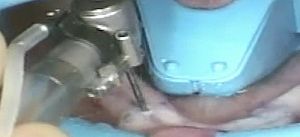Denture Implants
 English: Pilot hole being drilled for placement of 3M™ ESPE™ MDI Mini Dental Implant (Photo credit: Wikipedia)
English: Pilot hole being drilled for placement of 3M™ ESPE™ MDI Mini Dental Implant (Photo credit: Wikipedia)
Did you know that 20% of Americans have missing teeth? Dental implants and bridges are great solutions for one or more missing teeth, but what about when your teeth begin to fail you altogether?
Dentures are never fun to think about – can a complete set of fake teeth really replace those natural pearly whites? Many dentures require a form of adhesive to adhere to the gums, but this often comes out of place and causes your dentures to slide or pop inside your mouth when you chew or speak. They are also mainly ideal for softer foods, making harder foods impractical for eating. Is this really the only choice you have with dentures?
Why Choose Denture Implants?
Denture implants are the more comfortable, practical and reliable alternative to normal dentures. Implanted dentures are different from normal dentures because they are secured in place by a set of dental implants – small titanium screws rooted in the gums with heads meant for the denture to snap onto for comfortable, no-slip use. That means no more uncomfortable sliding, unsavory adhesive or avoiding those crisp foods you love.
Denture implants are not only convenient; they actually help to preserve your oral health. When you lose teeth, it actually will affect the bone structure of your face and jaw. Many people will gain sunken faces after losing teeth because of the bone loss it causes. Implant-anchored dentures help to preserve your jaw bone because the dental implants they use will fuse with the bone, keeping it from losing its structure.
What is the Procedure?
The implantation procedure is pretty simple. After numbing your mouth, your dentist will drill 2 to 4 2mm to 6mm holes per denture through your gum and bone. They will then insert the dental implants with the ball end protruding above the gums. Your denture will then have catchers attached to either side of its roof so that it can easily snap into place on the balls of the implants.
You will more than likely only need a dentist to perform this operation for you because of how simple it is. Depending upon the dentist and your personal oral situation, the dentist will either place 2 traditional 4mm to 6mm implants per denture or 4 mini 2mm dental implants per denture.
If you are considering getting your first set of dentures or an alternative to an uncomfortable pair you already own, talk to your dentist about the benefits you could gain by getting denture implants.

